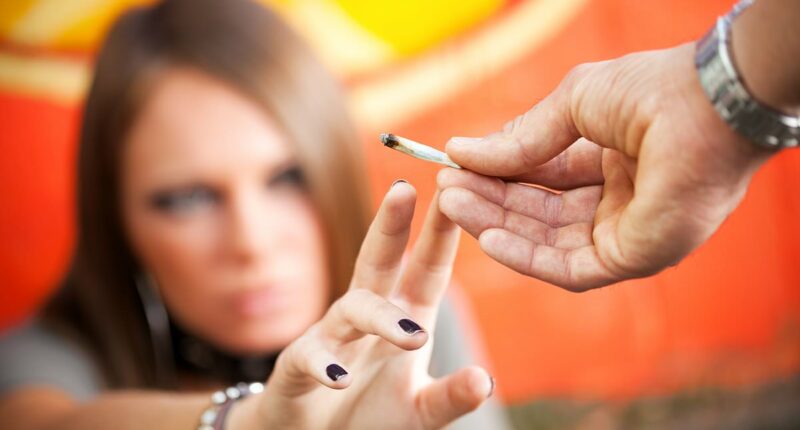Share this @internewscast.com
What might seem like a harmless rite of passage could be more dangerous than many realize. The UK’s leading psychiatrist has issued a stark warning about the impact of cannabis on developing young brains.
Dr. Lade Smith, who serves as the president of the Royal College of Psychiatrists, emphasized the potential dangers cannabis poses to teenagers’ mental health. She expressed concern that a strong pro-cannabis movement is leading parents to underestimate the risks associated with the drug.
According to Dr. Smith, starting cannabis use at a young age can damage brain development and may even lead to psychotic episodes in later life. In a conversation with The Sunday Times, she vividly described the situation, saying, “When you start smoking with your mates at 14 or 15, you are literally growing your brain in a cannabis soup.”
Dr. Smith left no room for doubt, stating emphatically, “Cannabis is a cause of psychosis.” Her comments underline the importance of recognizing and addressing the potential mental health repercussions that come with adolescent cannabis use.
‘When you start smoking with your mates at 14 or 15 you are literally growing your brain in a cannabis soup,’ Dr Smith told The Sunday Times.
‘There’s no doubt at all. Cannabis is a cause of psychosis.’
This health condition is a serious mental illness where a person loses touch with reality, often involving symptoms like hallucinations and delusions which can cause them to pose a danger to themselves or others.
Figures show cannabis is consistently the most consumed illegal drug in England and Wales, with 2.3 million people estimated to have used it in the year to March 2024.

Many parents still think cannabis is relatively safe for their children to have, Dr Smith warned, and called on the government to raise awareness of the potential harms (stock image)
Research, published last year, shows adolescents who used it were 11 times more likely to have a psychotic episode as an adult.
However, many parents still see it as relatively safe, Dr Smith warned, calling on the government to do more to educate parents and young people.
‘We’ve not got the public health message right,’ she said. ‘We know that cannabis is not a safe option.’
She explained that – as well as psychosis – smoking cannabis is also linked to a higher risk of anxiety and depression.
Children from any walk of life, including from well-to-do families, have developed psychotic illnesses, carried out dangerous stunts or fallen foul of the police due to their cannabis use, she warned.
A study published in the journal JAMA Psychiatry found that rates of first episode psychosis are higher in south-east London, where she works, than anywhere else in Europe.
A staggering 97 per cent of patients in her service had a substance abuse problem, with high-strength cannabis the main drug of choice.
The cannabis that has been available in the last 10-15 years in the UK is high-strength, meaning it contains high levels of the active compound tetrahydrocannabinol (THC) which affects the brain.

Cannabis contains THC, a compound that can affect the brain in many ways. Studies suggest it can reduce the amount of grey matter – important for processing information and sensory control (file image)
It can interfere with the release of dopamine in the brain’s reward centre, reduce the amount of grey matter in the brain, lower inhibitions and cause chronic bronchitis symptoms.
Smoking cannabis ‘regularly’ is the equivalent of just one spliff per week, Dr Smith explained, adding that having a problem with the drug ‘could completely ruin your life’.
Seven years ago the law was changed to allow the prescriptions of cannabis–based medicines that include cannabidiol (CBD), which does not give the same high but can still alter consciousness and the perception of pain.
Dr Smith said she believes the use of cannabis as a medicine should face further scrutiny. Sir Chris Whitty, the chief medical officer, also warned against ‘cannabis exceptionalism’ in 2019.
Separate studies have also indicated that cannabis use can negatively impact female fertility and lead to increased levels of paranoia.
Speaking previously about the effects of cannabis on mental health Dr Emily Finch, chair of the Royal College of Psychiatrists’ Addiction Faculty, said: ‘Society must be more aware of the substantial evidence on cannabis harms, and correct the widespread misapprehension that cannabis is not an addictive substance.
‘Cannabis is the most widely used illicit substance in the UK, and around a third of people who use cannabis develop a problem with the drug at some point during their lives. This is similar to the proportion of people who will develop a problem with alcohol.
‘The use of both natural and “synthetic” cannabinoids over the long-term risks addiction and severe co-occurring mental illness harms.’

















